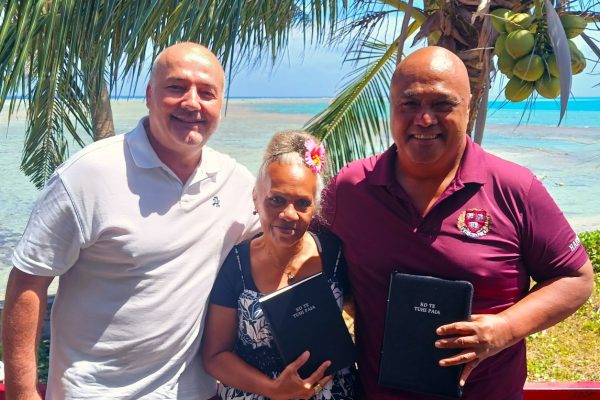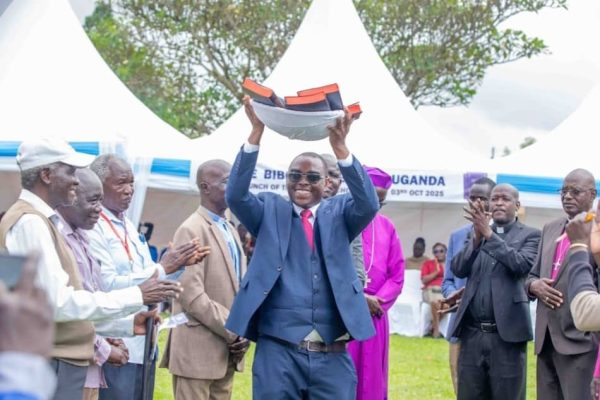 On June 8, the Bible Society of Tanzania (BST) marked a historic milestone with the launch of the first full Kikagulu Bible in Gairo District in the Morogoro region. This anticipated event not only celebrated the completion of this significant translation effort, but also affirmed how translation positively impacts the cultural preservation of indigenous languages.
On June 8, the Bible Society of Tanzania (BST) marked a historic milestone with the launch of the first full Kikagulu Bible in Gairo District in the Morogoro region. This anticipated event not only celebrated the completion of this significant translation effort, but also affirmed how translation positively impacts the cultural preservation of indigenous languages.
The ‘Kikagulu’ language (also referred to as ‘Kikaguru’) is the language spoken by the ‘Kagulu’ people (also referred to as ‘Kaguru’). 60% of the 420,000 Kikagulu language speakers are Christians.
Held in the heart of the Kagulu community in Morogoro, the launch brought together government leaders, church representatives, translators, and local communities. The Honourable Lay Canon Prof. Palamagamba John Aidan Mwaluko Kabudi, Tanzania’s Minister of Information, Culture, Arts, and Sports officiated the celebrations. Hon. Kabudi called the translation a national treasure in his keynote address, underscoring the importance of indigenous languages in spreading the Gospel and safeguarding Tanzania’s cultural heritage.
Bishop Godfrey Sehaba of the Anglican Diocese of Morogoro officially blessed and launched the Bible, joined by key church leaders across denominations, including the Evangelical Lutheran Church in Tanzania, the Free Anglican Church, and the Catholic Diocese of Morogoro. Their shared presence reflected the ecumenical spirit and unity of the body of Christ in this significant work.
 Traditional Kagulu songs, choir performances, and dance offered a vibrant expression of joy and gratitude throughout the day’s celebrations. These cultural elements highlighted the deep connection between language, worship, and community, and demonstrated how Scripture in one’s mother tongue brings God’s Word closer to the heart.
Traditional Kagulu songs, choir performances, and dance offered a vibrant expression of joy and gratitude throughout the day’s celebrations. These cultural elements highlighted the deep connection between language, worship, and community, and demonstrated how Scripture in one’s mother tongue brings God’s Word closer to the heart.
During the closing remarks, Dr. Alfred Elias Kimonge, BST General Secretary, offered heartfelt thanks to the many individuals who contributed to the project. He formally recognised translators Bishop Frederick Chingwaba, Fr. Benjamini Mkuchu, Bishop Gessford Chitemo, and project coordinator Bishop Michael Peter Nhonya, as well as the editorial team. Gifts were presented in recognition of their dedication and service.
The Kikagulu Bible translation project reflects BST’s enduring commitment to ensuring the Bible is available and accessible. As one of the country’s more than 120 indigenous languages, the thousands of Kikagulu speakers can now encounter God’s Word in their heart language.
This translation serves as an inspiring reminder to the global Bible translation and distribution community of the transformative power of the Bible in a mother tongue. The Kikagulu Bible not only meets a linguistic and spiritual need—it reinforces the universal truth that every language matters to God. BST continues to partner with various stakeholders to ensure that the Holy Scriptures reach all Tanzanians in the languages they understand.

Ministry to the Kagulu Community in Morogoro
The Bible translation project is not the only ministry that BST provides to the Kagulu community. BST also facilitates literacy classes which aim to educate 3,000 women and girls from the Kagulu community on how to read and write.
According to UNESCO, Tanzania’s male literacy rate is 83.2%, however the female rate is 73.09% – demonstrating a disparity between the education rates of men and women.
Improving literacy rates among the Kagulu community will enable these people to read their new translation and forge a connection with God through the reading of His Word. Find more information about this Kagulu community literacy project here.
Seeking to improve the literacy ministry in the future, BST are eager to develop a dictionary for the Kikagulu language – to streamline the teaching of the language, and also help Kagulu community to interact with their Bible.
Future of Bible Ministry in Tanzania
On the horizon, there are projects which are currently underway that BST is excited to see come to fruition. BST General Secretary, Dr Kimonge shared one such project which he is anticipating will have a profound impact:
“The Kifipa Bible would be most exciting in the future. The reason is that the speakers of the language are known to be one of the most witchcraft/occult practising tribes in Tanzania. I expect the Bible will have a far-reaching impact by reducing the occult practices.”
With several translation projects underway, Dr Kimonge has asked us to pray that financial resources would be found to ensure these projects can be completed:
“Kindly pray for adequate funding for our projects so that we can remunerate the translators well and meet other translation expenses. That would enhance the translation work and reduce the time needed to complete a translation. Our translations are taking too long and delaying the expected impact.”
Life and Faith in Tanzania
Tanzania is a nation where faith plays a central role in daily life. More than 95% of the population identify as religious, with Christianity and Islam being the dominant faiths. Christianity is slightly more prevalent, often practised across diverse denominations such as Catholicism, Lutheranism, Anglicanism, and Pentecostalism. Traditional African spiritual practices and beliefs also persist.
 Tanzanians tend to express their faith openly and incorporate it into community life, education, and public discourse. Religious institutions also play a significant role in delivering education, healthcare, and social services.
Tanzanians tend to express their faith openly and incorporate it into community life, education, and public discourse. Religious institutions also play a significant role in delivering education, healthcare, and social services.
The agricultural industry employs nearly 65% of the population, and many people live in rural areas and rely on subsistence farming. Access to healthcare, education, and digital technologies can be limited, though this is steadily improving. Despite economic challenges, Tanzanians are known for their resilience, communal values, and a culture of generosity rooted in faith.
The strong connection between faith and daily life in Tanzania means that initiatives like Bible translation, distribution, and church-based development projects can have a profound and lasting spiritual, social and economic impact.














